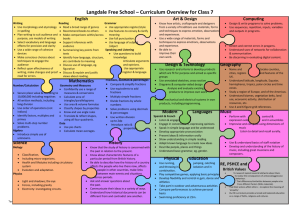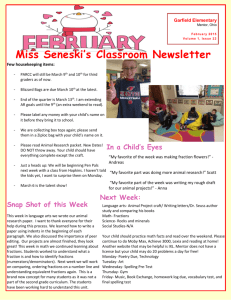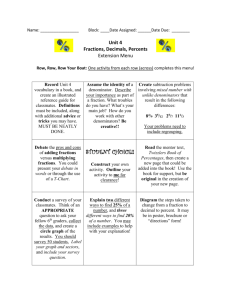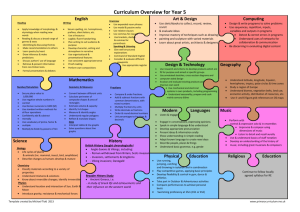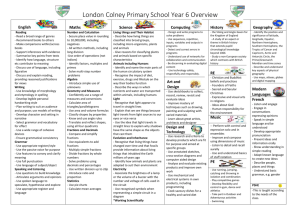The Big Debate - Amazon Web Services
advertisement
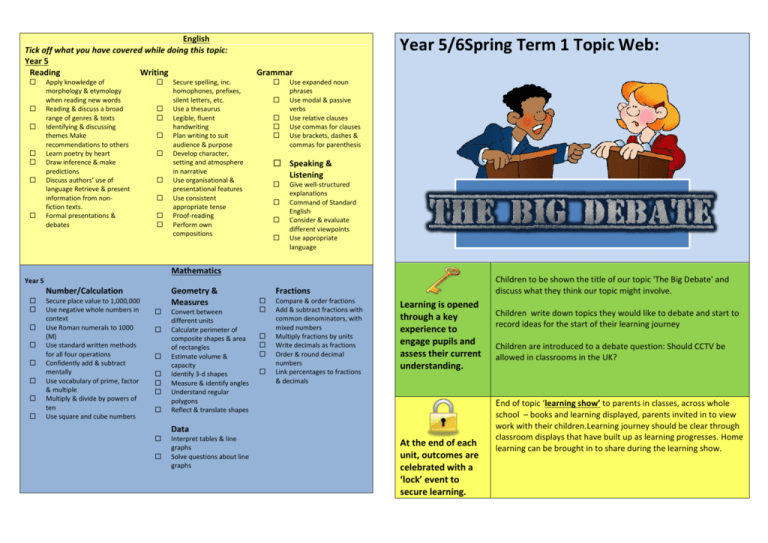
English Tick off what you have covered while doing this topic: Year 5 Reading Writing Apply knowledge of morphology & etymology when reading new words Reading & discuss a broad range of genres & texts Identifying & discussing themes Make recommendations to others Learn poetry by heart Draw inference & make predictions Discuss authors’ use of language Retrieve & present information from nonfiction texts. Formal presentations & debates Year 5/6Spring Term 1 Topic Web: Grammar Secure spelling, inc. homophones, prefixes, silent letters, etc. Use a thesaurus Legible, fluent handwriting Plan writing to suit audience & purpose Develop character, setting and atmosphere in narrative Use organisational & presentational features Use consistent appropriate tense Proof-reading Perform own compositions Use expanded noun phrases Use modal & passive verbs Use relative clauses Use commas for clauses Use brackets, dashes & commas for parenthesis Speaking & Listening Give well-structured explanations Command of Standard English Consider & evaluate different viewpoints Use appropriate language Mathematics Children to be shown the title of our topic 'The Big Debate' and discuss what they think our topic might involve. Year 5 Number/Calculation Secure place value to 1,000,000 Use negative whole numbers in context Use Roman numerals to 1000 (M) Use standard written methods for all four operations Confidently add & subtract mentally Use vocabulary of prime, factor & multiple Multiply & divide by powers of ten Use square and cube numbers Geometry & Measures Convert between different units Calculate perimeter of composite shapes & area of rectangles Estimate volume & capacity Identify 3-d shapes Measure & identify angles Understand regular polygons Reflect & translate shapes Fractions Compare & order fractions Add & subtract fractions with common denominators, with mixed numbers Multiply fractions by units Write decimals as fractions Order & round decimal numbers Link percentages to fractions & decimals Learning is opened through a key experience to engage pupils and assess their current understanding. Interpret tables & line graphs Solve questions about line graphs Children are introduced to a debate question: Should CCTV be allowed in classrooms in the UK? End of topic ‘learning show’ to parents in classes, across whole Data Children write down topics they would like to debate and start to record ideas for the start of their learning journey At the end of each unit, outcomes are celebrated with a ‘lock’ event to secure learning. school – books and learning displayed, parents invited in to view work with their children.Learning journey should be clear through classroom displays that have built up as learning progresses. Home learning can be brought in to share during the learning show. Speaking, Listening & Drama Opportunities Listen and respond appropriately Participate in discussions Maintain attention and participate actively in collaborative conversations Speak audibly and fluently with an increasing command of Standard English Participate in debates Gain and maintain the interest of listeners Consider and evaluate different viewpoints Select and use appropriate registers Science Focus Evolution and Inheritance The children will be: Discussing fossils as evidence of life millions of years ago. Studying the life of Mary Anning. Comparing offspring with parents and seeing how plants/animals are adapted to habitats. Looking at Darwin, Wallace & Mendel’s contributions to our understanding of evolution Computing Scratch -Programming Project Outputs - Class room environment created by the children that reflects their learning -A variety of work based around new learning, debates and research. This could be in the form of writing, drawing, photos, art work. -Science display of learning journey with final information reports shown. -Literacy display of learning journey, photos of debated and the final piece of biography writing shown Children choose a piece of work to publish for class display Extended Writing Opportunities Persuasive writing: Argument text –To write an argument for or against the use of CCTV cameras in classrooms the UK? Information Reports -: Evolution – Darwin, Wallace and Mendel Breeds of Dog Adaptation in plants and animals – advantages and disadvantages Biography writing – The remarkable life of Mary Anning Charles Darwin Humanities RE: Community and People of Faith - Islam Music Children to perform, listen to, review and evaluate the works of the great composers and musician . Children form opinions about what the composers were trying to get across through their music. Spanish Spanish teacher to continue building on previous knowledge. PSHE &The Drayton Park Way Cross Phase Opportunities Children to share work produced during class and phase assemblies. Phase Assemblies Children will attend phase assemblies based the theme of Ambition and how this skill can help them in their everyday lives. Children will be explore inspiration and motivational life stories. Our Drayton Park Way focus will be Ambition: Learning that intelligence and success is not fixed or predetermined. Even if we are not good at something now, we can become so by working hard. Learning to always try our best. Learning to have high expectations of ourselves and others. Learning that in order to 'aim for the stars' we something will need to make mistakes and we must learn from them. Books we are exploring: A variety of non-fiction books about evolution, adaptation, Earth, space and forces. Big Questions from Little People by Gemma Elwin Harris A variety of argument texts debating different topics Art & Design The Big Debate - What is good piece of Art? Look at famous pieces of art work - what do you think about them? Does everyone agree? Is there a right or wrong opinion when it comes to art? Children to learn about great artists, architects and designers in history that expressed their opinions through art. Children to recreate famous art pieces of their choice in their own style using a variety of techniques. The art of fossils - fossil drawings, children express learning through art work - life millions of years ago.
